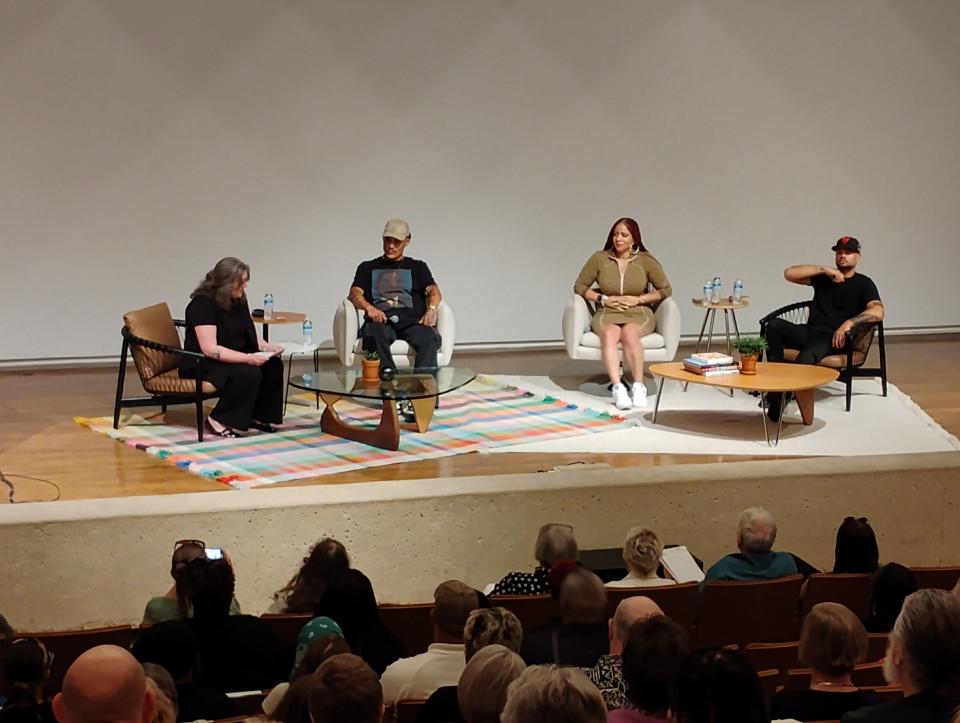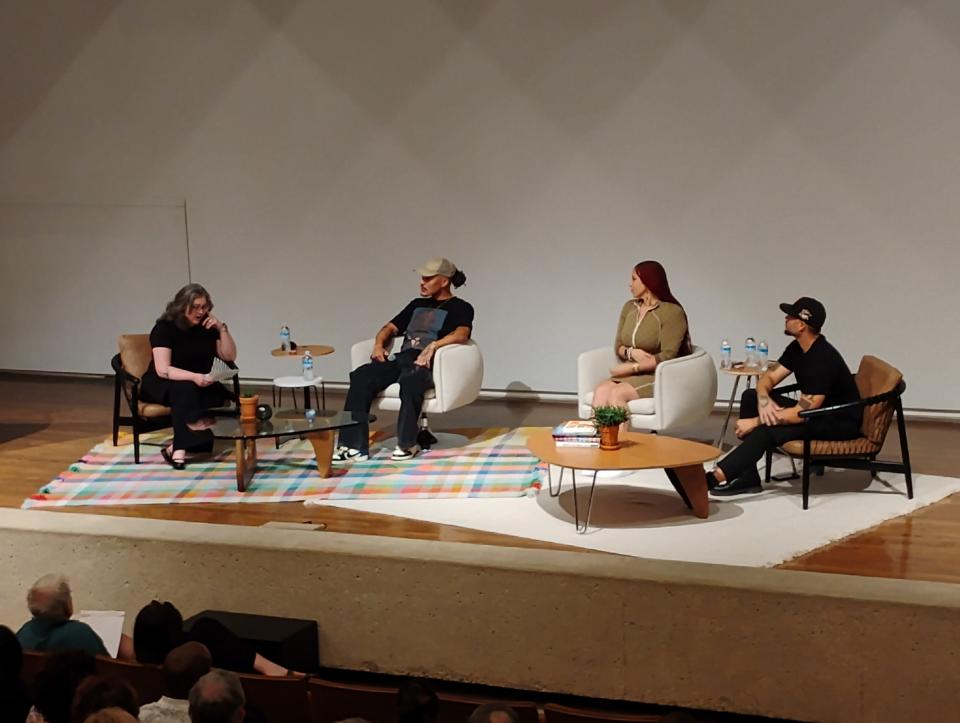How being Black in Iowa helps shape the work of these 3 artists, activists
- Oops!Something went wrong.Please try again later.
Nikole Hannah-Jones, the Pulitzer Prize-winning author and Iowa native, said at an Des Moines Art Center panel on Sunday she "grew up in two different Iowas" that treated Black Iowans different than their white peers.
"The Black and white side of my family both worked hard, but the Black side couldn't get nearly as much for it," she said.
Hannah-Jones, who wrote the "1619 Project," joined artists b. Robert Moore and Jordan Weber at the Des Moines Art Center on Sunday afternoon for a panel discussion and audience Q&A. All are Iowans, who grew up in a state that lacks racial diversity — Iowa's population is nearly 85% white, according to the U.S. Census Bureau. There also exists wide disparities between Black and white residents across various measures, including employment, education and incarceration rates.
More: Des Moines native Robert Moore's world-renowned art to be featured in hometown this summer
The Art Center, which currently has an exhibit by Moore, "Iowa Artists 2024: b. Robert Moore: In Loving Memory" hosted the panel to learn more about "how this environment has been a catalytic factor in their pursuits to bring wider and more nuanced stories of our American history to the forefront," according to a news release announcing the event.
The three spoke on how those dynamics affected them growing up as Black Iowans and how it shapes their work now. Here's the biggest takeaways:

History has layers that should be 'peeled back'
Hannah-Jones is most famous for the "1619 Project," a series of articles and essays published in the New York Times that seek to reframe American history specifically around the institution of slavery.
In Iowa, there's been a legislative push since 2020 to restrict the use of materials like the "1619 Project" and other works that emphasize the legacy of racism in the U.S.
The irony is not lost on the speakers, all of whom discussed that their work is about more than facts and how important it is to have deeper conversations.
"The '1619 Project' isn't really history," Hannah-Jones said. "It's memory."
Weber pointed out that history as dry facts isn't in question, but how and which facts are taught is.
"We're taught history as a fairy tale," he said. "But for some it was a nightmare. You have to peel back those layers."
Moore posed a slightly different angle, pointing to the connection between Iowa and the land.
"Iowa is the No. 1 altered landmass in America," he said, referring to its vast native prairie and oak savanna land being turned into farmland. "Its history is trauma to the land and trauma to the body."
More: Immigration pushed Iowa's 19th-century growth; will be key to future growth, expert says
Iowa can be difficult for Black organizations, families
Moore and Weber are from Des Moines and Hannah-Jones is from Waterloo. They all agreed that Iowa is a hard state for a Black activist.
"It's home," Weber said, "but sometimes I don't know if I belong."
He likened it to a family gathering with a "mean relative." He pointed to the idea of "Iowa nice" as contributing to this problem, saying "that fakeness ain't for me."
Hannah-Jones spoke about how Iowa has changed since she was young.
"The Iowa I grew up in did value public education," she said. "I can't imagine the Iowa of my childhood passing a right-to-work law. I couldn't imagine it passing some of the regressive laws we're seeing."
Right-to-work laws allow workers to avoid paying union dues, even if they work in a unionized workspace. Iowa's right-to-work law is a piece of a larger legislative agenda in Iowa that critics say undermine labor rights.
Hannah-Jones pointed to those, as well as education policies that she says "restrict the imagination," as examples of new laws that Iowa has passed that especially undermine Black Iowans.
She said it was important not just to acknowledge those changes, but to be honest with how bad some of them are.
"Terry Branstad looks amazing. When I was growing up he was the devil, now my momma would love to see Terry Branstad," she said, referring to the Republican who served as Iowa's 39th governor from 1983 to 1999 and its 42nd from 2011 to 2017.
Hannah-Jones also spoke about the struggle for Black Iowans to get support for projects. Hannah-Jones started the 1619 Freedom School, an after-school literacy program in Waterloo, and said that none of the funding for the project came from Iowa.
"I'd love to see Black organizations and Black NGOs be able to afford a practice in Iowa like white ones are," Weber said. "We have organizations that give $10,000 or $20,000 to Black organizations, while giving a lot more to white ones."
The inability to get funding and recognition as a Black Iowan is something that troubles all three panelists. Moore even said he's stopped applying for grants because of how frustrating it can be.

Black artists have hope for Iowa's future
Despite the many problems they see in Iowa and America as a whole, they were all able to identify ways that things could be improved.
"It is hard to have impact in a city as big as New York," Hannah-Jones said. "It is easy to have a substantial impact in Iowa. Your investment doesn't even have to be that grandiose to make an impact."
More: Des Moines artist among 10 'accomplished practitioners' chosen worldwide for Harvard fellowships
All three are parents, and Moore said he stays in Iowa in large part for his children. His hope is that through his work, future generations can prosper.
"I know what happens when seeds are planted," he said. "There's new growth. So my only hope is that I can plant some seeds, but I ain't thinking I'm gonna see the fruits of my labor."
Leave this room energized to make a difference, panel says
The Art Center's Levitt Auditorium has a capacity of around 250, but some people stood and others sat at a balcony overlooking the event. The crowd itself inspired some hope for the speakers.
"There's power in unity," Moore said. "We're vibrating together. That energy can't be made up."
Hannah-Jones encouraged audience members to share their experience and what they learned.
"I hope we don't leave the energy at the door," she said. "Our world was constructed, but that means it can be deconstructed and made into something better."
For people interested in contributing to their cause, they encouraged people to visit or donate to dsmpublicartfoundation.org to help promote Black artists in Iowa, and Hannah-Jones directed people toward her own 1619freedomschool.org to help promote literacy in Black children.
Moore's exhibit is on display at the Art Center through Oct. 20.
Ryan Magalhães is a reporter for the Register. Reach them at rmagalhaes@dmreg.com.
This article originally appeared on Des Moines Register: How being Black in Iowa shapes the work of these 3 artists, activists

